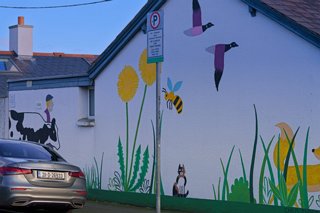MORE ABOUT THE MURALS
Halliday Road is a residential street located in the Stoneybatter neighbourhood, known for its mix of traditional cottages and more modern homes. Stoneybatter is a popular area with a village-like feel despite being close to Dublin's city centre.
Two large-scale murals on the gable ends of houses in Stoneybatter were commissioned by Dublin City Council, and this is one of them. Unfortunately my view was obstructed by people and parked cars.
Chris Judge is an illustrator, artist, and children's picture book author from Dublin, Ireland. Since 2011, Chris has written and illustrated over 35 children's books, often collaborating with authors like Roddy Doyle, David O'Doherty, and Eoin Colfer. His first book, The Lonely Beast, won the 2011 Specsavers Irish Children's Book of the Year Award at the Bord Gáis Energy Irish Book Awards.
Chris also creates large-scale artworks, most notably three large mosaics in collaboration with Triskill Design for Stanhope Street School in Dublin, Scoil Bhride in Kildare, and Mountrath Community School.
Street artists in Dublin face a number of challenges, including:
Legal Restrictions and Planning Permission: Dublin City Council takes a firm stance on street art, often requiring artists to obtain planning permission before painting murals. This can be a time-consuming and bureaucratic process, discouraging spontaneous expression which is a core element of street art. Occasionally, works are removed even if the building owner has consented.
Conflicting Views on Art: While many people appreciate the vibrancy and creativity that street art brings to urban spaces, others view it as vandalism or a nuisance. This can lead to tension with authorities and property owners.
Lack of Designated Spaces: Dublin lacks sufficient dedicated spaces for street artists to legally practice their craft. This leaves artists feeling limited and makes it difficult for them to showcase their work without risking legal consequences.
Competition: Dublin has a thriving street art scene. This fosters healthy competition but can also make it difficult for artists to gain recognition and stand out, especially for newcomers to the scene.
Economic Hardship: Like many artists, street artists in Dublin often struggle financially. Their art can be a source of income, but it might be inconsistent and unpredictable, especially if they face legal hurdles or lack of public recognition.
Initiatives and Organizations:
Some organisations are working to support street artists in Dublin and improve their circumstances. Groups like Subset advocate for greater acceptance of street art and lobby for the creation of more legal spaces for artists to express themselves. Such initiatives can potentially increase understanding and opportunities for street artists within Dublin's community.
Two large-scale murals on the gable ends of houses in Stoneybatter were commissioned by Dublin City Council, and this is one of them. Unfortunately my view was obstructed by people and parked cars.
Chris Judge is an illustrator, artist, and children's picture book author from Dublin, Ireland. Since 2011, Chris has written and illustrated over 35 children's books, often collaborating with authors like Roddy Doyle, David O'Doherty, and Eoin Colfer. His first book, The Lonely Beast, won the 2011 Specsavers Irish Children's Book of the Year Award at the Bord Gáis Energy Irish Book Awards.
Chris also creates large-scale artworks, most notably three large mosaics in collaboration with Triskill Design for Stanhope Street School in Dublin, Scoil Bhride in Kildare, and Mountrath Community School.
Street artists in Dublin face a number of challenges, including:
Legal Restrictions and Planning Permission: Dublin City Council takes a firm stance on street art, often requiring artists to obtain planning permission before painting murals. This can be a time-consuming and bureaucratic process, discouraging spontaneous expression which is a core element of street art. Occasionally, works are removed even if the building owner has consented.
Conflicting Views on Art: While many people appreciate the vibrancy and creativity that street art brings to urban spaces, others view it as vandalism or a nuisance. This can lead to tension with authorities and property owners.
Lack of Designated Spaces: Dublin lacks sufficient dedicated spaces for street artists to legally practice their craft. This leaves artists feeling limited and makes it difficult for them to showcase their work without risking legal consequences.
Competition: Dublin has a thriving street art scene. This fosters healthy competition but can also make it difficult for artists to gain recognition and stand out, especially for newcomers to the scene.
Economic Hardship: Like many artists, street artists in Dublin often struggle financially. Their art can be a source of income, but it might be inconsistent and unpredictable, especially if they face legal hurdles or lack of public recognition.
Initiatives and Organizations:
Some organisations are working to support street artists in Dublin and improve their circumstances. Groups like Subset advocate for greater acceptance of street art and lobby for the creation of more legal spaces for artists to express themselves. Such initiatives can potentially increase understanding and opportunities for street artists within Dublin's community.

MORE ABOUT THE MURALS